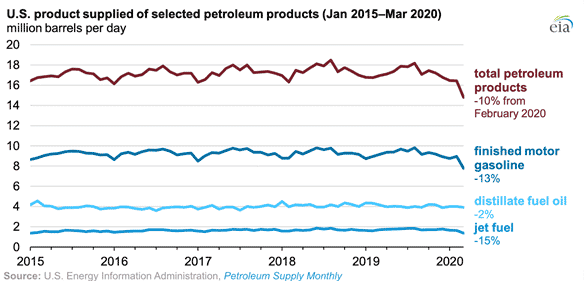U.S. Petroleum Demand Fell by Near-Record Amounts in March due to COVID-19: EIA

Gasoline and jet fuel demand fell by near-record amounts because of the stay-at-home orders and travel limitation since the breakout of COVID-19, according to a June 9 report from the U.S. Energy Information Administration. The gross inputs into refineries fell by 4 percent from February to March to an average of 15.8 million barrels per day, the lowest monthly level since October 2015.
Among other highlights:
- Gasoline demand fell by 13 percent to 7.8 million barrels per day from February to March, the lowest level since twenty years ago and the second-largest decline on record.
- Jet fuel demand declined by 15 percent in the same period of time, which marks the largest single monthly change in the administration’s record.
- Demand for distillate fuel in March remained stable compared with its January and February levels, falling only by 2 percent because of its lower elasticity of demand.
- Gulf Coast refinery runs, accounting for more than half of the nation’s refining capacity, remained stable between February and March because of its weaker connection with in-region consumption and returned operation after maintenance in February.
- However, operations of refineries in other parts of the country decreased in March as a result of lower demand for petroleum products; gross inputs into refineries on the west coast fell by 10 percent from February to March.
- Because of the lower demand for petroleum products but relatively stable crude oil production, U.S. crude oil inventories increased by 6 percent to 482 million barrels, which is the third-largest month-over-month increase in the administration’s record.
- The administration’s new tracking report on oil storage utilization since April shows that U.S. crude oil stocks reached 52 percent of working capacity by the end of March.
EnerKnol Pulses like this one are powered by the EnerKnol Platform—the first comprehensive database for real-time energy policy tracking. Sign up for a free trial below for access to key regulatory data and deep industry insights across the energy spectrum.
ACCESS FREE TRIAL